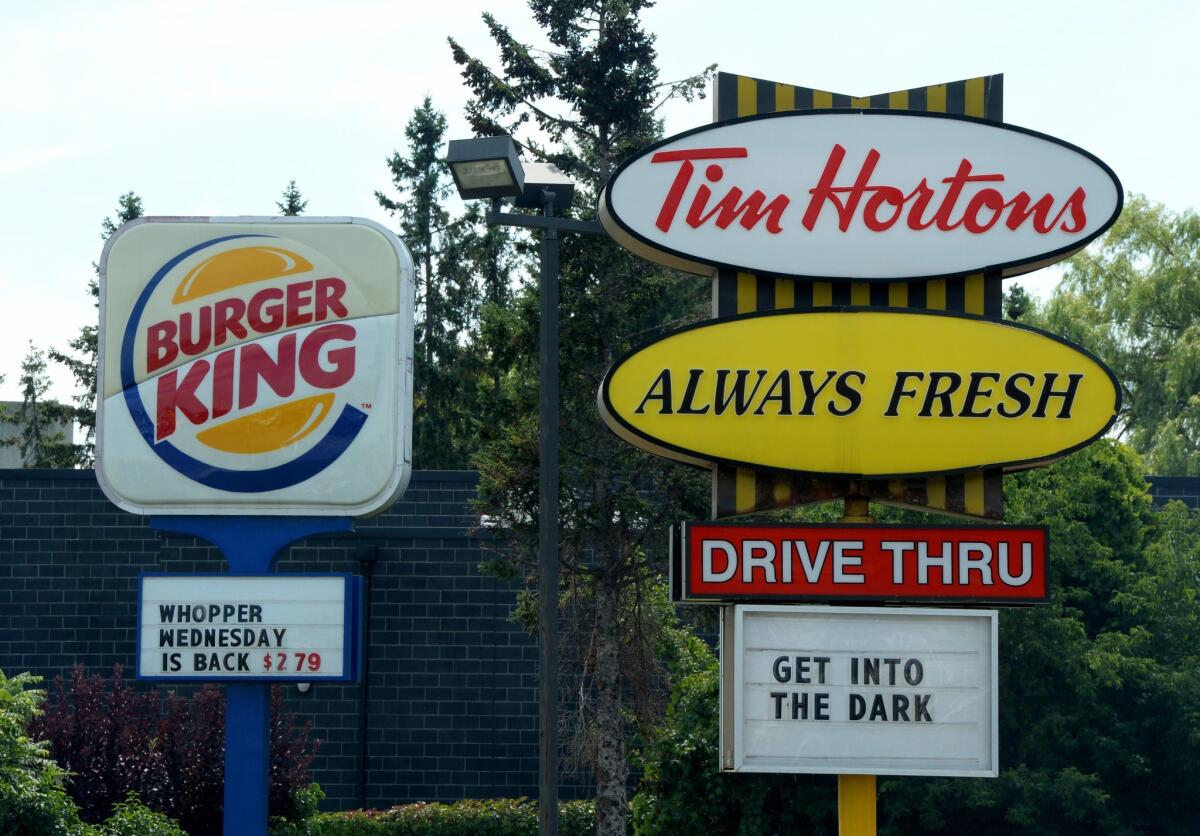Burger King is betting on breakfast in potential Tim Hortons deal

Burger King Worldwide Inc.’s potential purchase of Canadian coffee-and-doughnut chain Tim Hortons Inc. indicates that the fast-food company is focused on the booming breakfast arena.
The Miami hamburger chain is competing furiously with rivals such as McDonald’s and Starbucks for customers in the morning, one of the fastest growing segments in the restaurant industry.
That growth has prompted fast-food chains such as Taco Bell to offer new breakfast items, including a Waffle Taco, and pushed Dunkin’ Donuts to expand aggressively in California.
Fast-food chains are hoping to pull in customers who increasingly grab and go when they rush off to work or school. Visits to restaurants in the morning climbed 2% in the 12 months that ended in June, compared with a drop of 2% each in the lunch and supper categories, according to research firm NPD.
Although Burger King said it would move its headquarters to Canada if the negotiations turn into a successful deal -- sparking hand-wringing that yet another American company was looking to lower its tax bill by moving away -- observers said competing for breakfast diners was a key part of the appeal of Tim Hortons.
Burger King has lagged behind McDonald’s, which has long dominated the breakfast competition with its Egg McMuffin. The company’s partnership with Seattle’s Best Coffee has failed to attract many customers in the morning, observers said.
“Burger King really has very few breakfast sales,” said Andy Brennan, lead analyst at IBISWorld. “Breakfast is contributing most of the growth in the industry at the moment. That is why they are jumping in with Tim Hortons.”
Buying the Canadian company would give Burger King control over a brand that has long been connected to morning joe and breakfast treats, especially among Canadian diners.
“In Canada, when people think breakfast, they think Tim Hortons,” Brennan said.
Tim Hortons, based in Oakville, Ontario, operates about 3,600 stores in Canada, according to government filings. Analysts said the company has more locations in Canada per capita than McDonald’s has in the U.S. It also controls a bigger slice of the Canadian breakfast market compared with McDonald’s.
“That is why Burger King would see it as an advantage partnering with Tim Hortons, which dominates in breakfast,” Brennan said. “The big challenge is overriding that association that most consumers have of Burger King as mainly lunch and dinner.”
Tim Hortons, which has saturated the Canadian market, could also get expertise from Burger King about expanding in the U.S. and overseas, observers said.
The company has been expanding in the U.S. over the last few years and now has about 860 stores, including three in California, accoring to its annual report.
Follow Shan Li on Twitter @ShanLi
More to Read
Inside the business of entertainment
The Wide Shot brings you news, analysis and insights on everything from streaming wars to production — and what it all means for the future.
You may occasionally receive promotional content from the Los Angeles Times.










